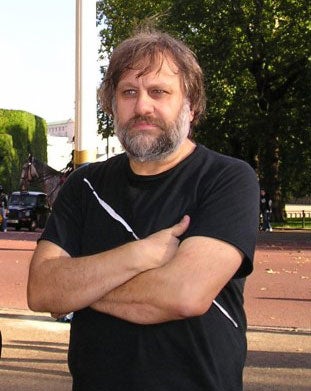Against The Grain: 'What if violence is needed to keep things as they are?'

Slavoj Zizek is international director of the Birkbeck Institute for the Humanities at Birkbeck, University of London. Professor Zizek argues that our understanding of violence is wrong.
How do we experience something as violent? We measure it by some zero level of normality. When nothing changes, when things just go on as normal, we say this is zero level, and then when something disturbs this, it is violence.
We should shift the perspective and ask, what if some kind of violence needs to go on to keep things the way they are? What if what we think of as violence is a distraction? To understand this, we must distinguish between subjective violence, systemic violence and symbolic violence.
Subjective violence is violence that is actively done, which can be attributed to a certain subject, such as a murderer, the police, a mob, terrorists – you can see who did it.
Systemic violence is anonymous violence. An example is George Soros. He has done wonderful things with his foundation, but if you look at his market speculation with currencies 10 years ago, what was the effect? Hundreds of thousands losing their jobs in south-east Asia. It was a social tsunami. This is anonymous, systemic violence.
And then you have symbolic violence. Today in the West, there is an obsession with harassment. Anything that another person does to you can be harassment. There is something very violent in this extreme sensitivity to another person's proximity. I'm opposed to the ideology of tolerance, because what we call tolerance is a form of intolerance.
How do we respond to this systemic and symbolic violence? Often I'm for a certain mode of violence. I don't have any problems with Chavez in Venezuela. People accuse Chavez of being too dictatorial. But he is not intervening in a zero violence space. He is intervening in a violent system. And the only way to intervene is to be counter-violent.
At other times, the most violent thing is to do nothing. Take feminism in traditional masculine societies: what seems like a non-violent patriarchal relationship relies on violence. The most important thing is not to protest, but not to participate. The first feminist text is Aristophanes' Lysistrata.
Sometimes you can disturb things most just by no longer participating, by stepping back. I'm not saying just do nothing, but undertake an active non-participation. In my sense, Gandhi was very violent. Of course, he wasn't violent in the sense of subjective violence, but, by not participating, he disturbed things, he prevented things functioning normally.
Join our commenting forum
Join thought-provoking conversations, follow other Independent readers and see their replies
Comments
Bookmark popover
Removed from bookmarks